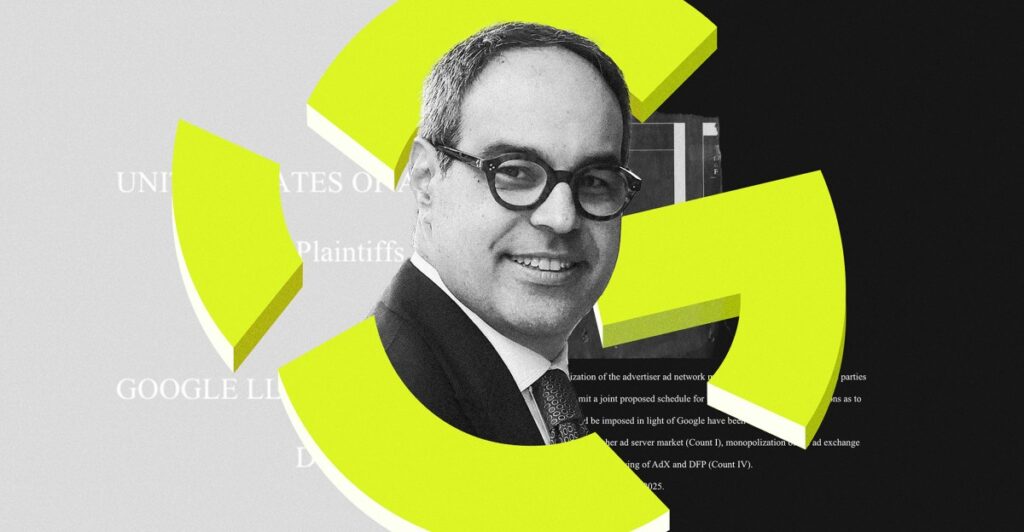Today, we’re talking about the very real possibility that the United States government might break up Google. To figure that all out, I invited Jonathan Kanter, the former assistant attorney general for antitrust under the Biden administration, to join me on Decoder again.
Jonathan left the DOJ after President Trump was elected, but he was the architect of the major antitrust cases that Google just lost, and which the Trump administration continues to pursue. In the first case, the court found that Google illegally maintained its monopoly over web search with a series of default placement deals, most particularly on the iPhone. That case is back in court right now for the second phase of the trial, where a judge will decide what the remedy will be — essentially, how Google will be punished.
The government is asking for a very big remedy: it wants Google to sell off its Chrome browser and make its search data more accessible to rivals. On top of that, literally simultaneously, Google just lost another antitrust case. A different court ruled last week that the company “substantially harmed publishers and users on the web with its advertising monopoly.”
That case will also now head to a remedies phase, and it’s very likely the government will ask for part of Google’s ad tech system to be sold off as well. Obviously, Google says it’s going to appeal all of this, so it will all take many more years to play out. But these initial verdicts are clear, and chances are high that Google and the web itself will be very different when everything comes to a close.
Now, the search case was filed during the first Trump administration, but Jonathan and his team took it to trial and won. Jonathan and his team also filed the Google ad tech case in 2023. That same team also filed a big antitrust case against Apple. And if you’ve listened to Jonathan’s appearances on the show, you know that he had to play the role of buttoned-up prosecutor while he was working for the DOJ. But now that he’s out, he’s much more free to share his real thoughts on what it takes to build and win these cases and about what should happen next.
You will not be surprised to hear that Jonathan thinks we should break up Google, but I think you’ll find it fascinating to hear how we put together his team, how he thought through the construction of these two cases in particular, and what kinds of audiences he thought he was addressing in the legal complaints themselves.
Listen to Decoder, a show hosted by The Verge’s Nilay Patel about big ideas — and other problems. Subscribe here!
Jonathan thinks of it as being head of a very specialized boutique law firm within the government, staffed by the most talented trial and antitrust attorneys the industry had to offer. That’s Decoder bait all by itself, but the weirdest part is that Jonathan left and had to hand that entire law firm and those cases over to an entirely new administration.
So I wanted to ask him about what happens now that Donald Trump and Attorney General Pam Bondi are in charge of his little law firm, especially because we’re seeing a pretty intense political realignment around antitrust these past few years. There are some prominent members of the new administration and the MAGA movement who have reached a rare consensus with some Democrats around breaking up big tech.
So I wanted to know if the DOJ’s Antitrust Division was still able to operate at the same level of effectiveness now, or if DOGE and the Trump administration’s purge of non-loyalists has hollowed it out. I also really wanted to know what Jonathan thought of the case his counterparts at the Federal Trade Commission are pursuing against Meta in court right now. That case seems much messier, but still might result in the breakup of Instagram and WhatsApp.
As you’ll hear, Jonathan was quite cordial about his replacement, Gail Slater. He was also optimistic about Attorney General Pam Bondi and Federal Trade Commission Chair Andrew Ferguson, who he hopes will continue to aggressively pursue tech regulation instead of treating the government like it’s “coin-operated,” which is something that many big tech executives would like it to be. In general, I’m deeply worried about the perception of corruption and the amount of nihilism that so many people feel towards the rule of law right now. So we talked about that a little bit as well.
You’ll hear me say this again a little bit, but we’ve had a lot of full-circle moments on Decoder this year, and getting Jonathan to come back on the show after he’s left office might be my favorite one yet.
If you’d like to read more on what we talked about in this episode, check out the links below:
- Google loses ad tech monopoly case | The Verge
- Google is in more danger than ever of being broken up | The Verge
- OpenAI tells judge it would buy Chrome from Google | The Verge
- Money, Chrome, and ChatGPT: The high stakes of Google’s monopoly trial | The Verge
- DOJ says Google must sell Chrome to crack open search monopoly | The Verge
- Google makes history with rapid-fire antitrust losses | NYT
- Read the antitrust ruling against Google | NYT
- Google ad monopoly ruling’s surprise winner: OpenAI | Axios
- DOJ antitrust chief is ‘overjoyed’ after Google monopoly verdict | Decoder
- DOJ’s Kanter says the antitrust fight against Big Tech is just beginning | Decoder
Questions or comments about this episode? Hit us up at decoder@theverge.com. We really do read every email!
Decoder with Nilay Patel
A podcast from The Verge about big ideas and other problems.
SUBSCRIBE NOW!
Read the full article here
